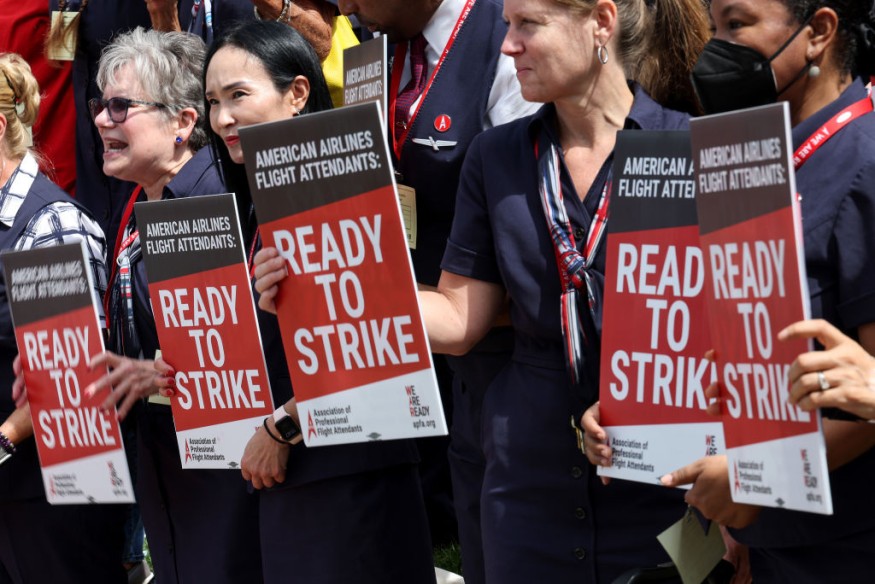American Airlines Flight Attendants Threaten Strike If Management Disagrees With 35% Raise, Benefits

In a significant move, American Airlines flight attendants have taken a decisive step by voting in favor of granting their union leaders the authority to call for a strike, according to the NY Post.
This action aims to pressure the airline's management to accede to their demands for a substantial 35% increase in wages and other associated benefits.
An overwhelming majority, exceeding 99% of the Association of Professional Flight Attendants members, have endorsed the potential strike option, which signifies a united stance in seeking a resolution.
Suppose the ongoing negotiations, mediated by a third party, fail to produce desired outcomes, the union must contemplate a work stoppage.
In contrast to the recent agreement granting a 40% salary elevation to pilots, the airline and the union, representing a considerable 26,000 flight attendants, are slated to engage in further discussions mediated by federal authorities in Dallas next week.
While both parties continue to seek common ground, flight attendants are expressing a diminishing level of patience.
Their spokesperson, Paul Hartshorn Jr., emphasized that the flight attendants have been without a raise since January 2019, underscoring the urgency of their demands.
The union's objectives encompass a comprehensive 35% wage hike across the board and a yearly 6% salary augmentation throughout a proposed three-year contract.
Additionally, the union advocates restoring onboard staffing levels, which had been curtailed due to the COVID-19 pandemic.
American Airlines Flight Attendants Can't Go On Strike Unless Given the Green Light
While the recent vote by American Airlines flight attendants to authorize a strike showcases their intent, it is important to note that the prospect of an actual strike is not imminent. Federal regulations create significant hurdles for such actions within the airline industry.
Federal law, specifically the Railway Labor Act, places substantial barriers on airline unions to legally execute strikes, per CBS News.
This includes obtaining a declaration from federal mediators that continued negotiations would be futile, a condition that rarely materializes.
Furthermore, the president and Congress have the authority to intervene, potentially delaying or preventing a strike.
The National Mediation Board must grant approval for flight attendants to initiate a strike, and even then, a mandatory 30-day "cooling off" period must transpire.
Lori Bassani Hedrick, the President of the Association of Professional Flight Attendants, acknowledged these legal constraints.
She clarified that while they cannot immediately initiate a walkout if management persists in offering insufficient compensation and retirement improvements while proposing concessions, the union would not hesitate to request authorization for a strike if necessary.
American Airlines pilots ratified a contract that guarantees a substantial pay increase exceeding 40% over four years earlier this month.
It is anticipated that American Airlines flight attendants may not secure a comparable raise, as their leverage is comparatively weaker due to the higher availability of flight attendants compared to pilots, who are presently in short supply.
Airline Ticket Prices Plunge
In the preceding month, the Southwest Airlines Pilots Association's request to suspend contract negotiations with their airline was denied by the National Mediation Board.
Engaged in talks with the carrier for over three years, the union resorted to strikes at several airports, including Los Angeles International, on August 30th.
Historically, pilot strikes are uncommon, with the last recorded instance transpiring in 2010 involving Spirit Airlines.
Regulatory bodies like the NMB take meticulous measures to avert work stoppages that could disrupt the crucial flow of interstate commerce facilitated by the airline and railway sectors. In some instances, Congress intervenes to manage these situations as well.
Concurrently, despite grappling with pilot shortages and challenges post-pandemic, the airline industry has shown signs of progress that benefit travelers.
Notably, airline ticket prices have experienced a decline, particularly in the realm of domestic flights, Kiplinger reports.
This price reduction is a welcomed development for passengers and underscores ongoing changes within the industry.
Read also: Texas: Greg Abbott's 'Law That Kills'
This article is owned by Latin Post.
Written by: Bert Hoover
WATCH: American Airlines flight attendants vote to authorize a strike - From WFAA
Subscribe to Latin Post!
Sign up for our free newsletter for the Latest coverage!
© 2026 Latin Post. All rights reserved. Do not reproduce without permission.















